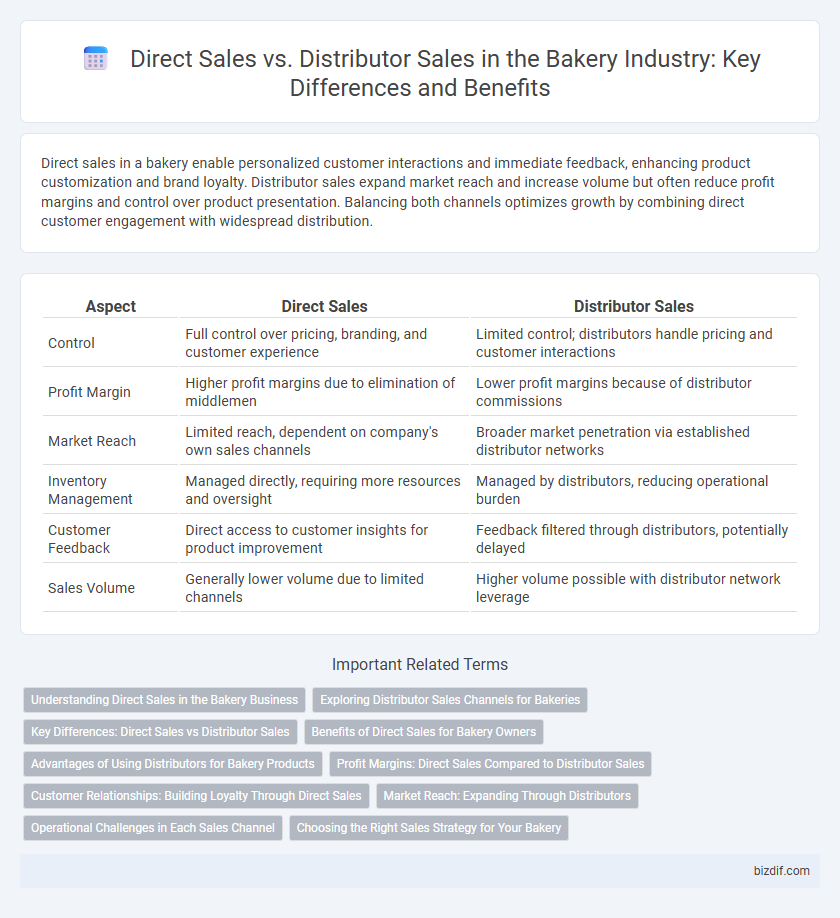Direct sales in a bakery enable personalized customer interactions and immediate feedback, enhancing product customization and brand loyalty. Distributor sales expand market reach and increase volume but often reduce profit margins and control over product presentation. Balancing both channels optimizes growth by combining direct customer engagement with widespread distribution.
Table of Comparison
| Aspect | Direct Sales | Distributor Sales |
|---|---|---|
| Control | Full control over pricing, branding, and customer experience | Limited control; distributors handle pricing and customer interactions |
| Profit Margin | Higher profit margins due to elimination of middlemen | Lower profit margins because of distributor commissions |
| Market Reach | Limited reach, dependent on company's own sales channels | Broader market penetration via established distributor networks |
| Inventory Management | Managed directly, requiring more resources and oversight | Managed by distributors, reducing operational burden |
| Customer Feedback | Direct access to customer insights for product improvement | Feedback filtered through distributors, potentially delayed |
| Sales Volume | Generally lower volume due to limited channels | Higher volume possible with distributor network leverage |
Understanding Direct Sales in the Bakery Business
Direct sales in the bakery business involve selling products straight to customers, enabling bakeries to build stronger relationships and receive immediate feedback. This approach enhances profit margins by eliminating intermediaries such as distributors, who typically take a percentage of sales. Direct sales channels include farmers markets, online orders, and in-store purchases, which increase brand visibility and customer loyalty.
Exploring Distributor Sales Channels for Bakeries
Exploring distributor sales channels enables bakeries to expand market reach by leveraging established networks that efficiently connect products with retailers and food service businesses. Distributors handle logistics, inventory management, and order fulfillment, allowing bakeries to focus on product quality and innovation while scaling operations. This approach often leads to increased sales volume and brand visibility without the complexities of direct customer management.
Key Differences: Direct Sales vs Distributor Sales
Direct sales in the bakery industry involve selling products directly to customers, ensuring better control over pricing, branding, and customer relationships. Distributor sales rely on third-party intermediaries to reach a broader market, offering scalability but less control over product presentation and customer interaction. Key differences include control over marketing strategies and profit margins, with direct sales typically yielding higher margins while distributor sales provide access to established distribution networks.
Benefits of Direct Sales for Bakery Owners
Direct sales enable bakery owners to maintain full control over product quality, ensuring freshness and catering directly to customer preferences. This approach increases profit margins by eliminating distributor fees, allowing bakeries to reinvest in premium ingredients and innovative recipes. Direct customer interaction fosters brand loyalty and provides immediate feedback, essential for tailored product development and enhanced customer satisfaction.
Advantages of Using Distributors for Bakery Products
Distributors offer extensive market reach and established relationships with retailers, enabling bakery products to access diverse customer segments efficiently. They handle logistics, inventory management, and order fulfillment, reducing operational burdens for bakery businesses and ensuring timely delivery. Utilizing distributors also allows bakeries to benefit from bulk purchasing and strategic promotional support, enhancing product visibility and sales growth.
Profit Margins: Direct Sales Compared to Distributor Sales
Direct sales in bakery businesses typically yield higher profit margins by eliminating intermediary fees, allowing bakeries to set prices directly with customers. Distributor sales often involve reduced profit margins due to wholesale pricing and distributor commissions, but they provide broader market reach and consistent volume. Balancing direct sales and distributor partnerships can optimize overall profitability and market penetration.
Customer Relationships: Building Loyalty Through Direct Sales
Direct sales in the bakery industry foster stronger customer relationships by allowing personalized interactions and immediate feedback, which enhances brand loyalty. Distributors often create a layer between the bakery and the consumer, limiting direct engagement and reducing opportunities for building long-term loyalty. Establishing direct sales channels enables bakeries to tailor products to customer preferences and provide exceptional service, driving repeat business and a loyal customer base.
Market Reach: Expanding Through Distributors
Distributors significantly expand bakery market reach by connecting products to broader retail networks and diverse customer segments beyond the bakery's direct access. Leveraging established distributor logistics accelerates entry into new geographic areas, increasing brand visibility while minimizing the bakery's operational burden. Direct sales often limit growth due to capacity constraints, whereas distributor partnerships amplify market penetration efficiently.
Operational Challenges in Each Sales Channel
Direct sales in the bakery sector face operational challenges such as managing inventory in real-time and maintaining consistent product quality across multiple locations. Distributor sales require coordination with third-party logistics, risk of delayed deliveries, and reduced control over product presentation and shelf life. Both channels demand robust forecasting and efficient communication to minimize waste and ensure timely replenishment.
Choosing the Right Sales Strategy for Your Bakery
Direct sales offer bakeries greater control over product presentation and customer interaction, leading to stronger brand loyalty and higher profit margins. Distributor sales provide access to wider markets and reduced logistical challenges but often involve lower margins and less control over pricing. Choosing the right strategy depends on your bakery's scale, target audience, and capacity to manage sales operations effectively.
Direct Sales vs Distributor Sales Infographic

 bizdif.com
bizdif.com